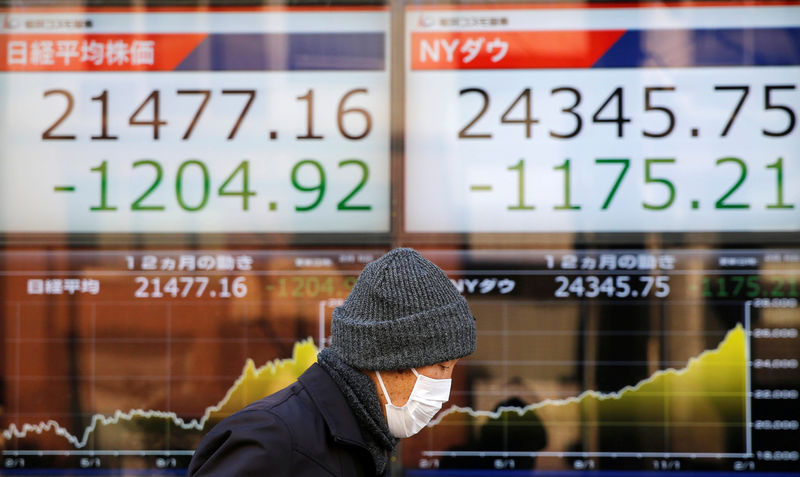By Hideyuki Sano
TOKYO (Reuters) - Asian shares gained on Monday, joining a global recovery for equity markets as sentiment improved gradually from a recent shakeout that was sparked by fears of creeping inflation and higher borrowing costs.
MSCI's broadest index of Asia-Pacific shares outside Japan (MIAPJ0000PUS) rose 0.5 percent, having recovered more than 40 percent of its losses from late January to last week's low.
Trading was slower than usual due to market holidays in the United States as well as Greater China.
Japan's Nikkei (N225) gained 2.0 percent while U.S. stock futures (ESc1) climbed gained 0.4 percent in Asia on Monday.
European share are also seen rising, with spread-betters expecting advances of up to 0.8 percent in Germany's Dax (GDAXI), 0.5 percent in France's Cac (FCHI) and 0.2 percent in Britain's FTSE (FTSE).
MSCI's index of stock markets across the globe (MIWD00000PUS) gained 4.3 percent last week, the best weekly performance since December 2011.
The rebound came after a two-week rout that wiped off more than 10 percent of value at one point, triggered by worries a rise in U.S. inflation may boost dollar funding costs.
The sell-off took place even as the corporate earning outlook improved on the back of strong global growth, bringing down equity valuations off highs hit earlier this year.
Just before the market ructions in late January, world shares were traded at 16.66 times their expected earnings, the highest levels since 2004, according to Thomson Reuters Datastream. They are currently at 15.33 times.
"The stocks' valuation has become cheaper to levels that are on par with the assumption that long-term U.S. bond yields will shoot up to 3.15-3.20 percent," said Nobuhiko Kuramochi, chief strategist at Mizuho Securities.
The U.S. 10-year Treasuries yield rose to a four-year high of 2.944 percent (US10YT=RR) last week, compared to 2.411 percent at the end of last year.
The two-year U.S. yield (US2YT=RR) hit its highest level since 2008 last week as investors bet the Federal Reserve will raise interest rates at its next policy meeting in March. The U.S. cash bond market is shut on Monday for a holiday.
"What's been told less about rising U.S. yields is the fact that this could reflect the impact of the Fed's balance sheet reduction and the likely increase in U.S. debt issues following Trump's tax cuts and infrastructure spending," said Hiroaki Hayashi, director of Fukokushinrai Life Insurance.
"The 10-year U.S. Treasuries could test the 3 percent level," he added.
In October, the Fed started trimming reinvestments in Treasuries and agency bonds. As the Fed plans to gradually reduce reinvestments, the impact is expected to get bigger this year.
While the Fed scales back its bond purchases, the U.S. government is expected to increase its debt issuance after Congress reached a deal earlier this month to raise spending by almost $300 billion over the next two years.
The minutes of the Fed's last policy meeting, held amid the equities tumble on Jan. 30-31, are due on Wednesday. Besides the outlook on rates, markets will be keen to see what, if anything, the Fed makes of the gyrations in markets.
A fall in the Vix index (VIX), a gauge of expected volatilities in U.S. stocks, also helped underpin improving sentiment.
The recent sell-off is believed to have been amplified by a jump in the Vix as many players are thought to have adjusted their portfolio in line with the change in volatilities.
"The latest rout was driven more by forced selling of such players as risk parity strategies and Commodity Trading Advisors (CTAs). Their selling appears to be over," said Mizuho's Kuramochi.
In the currency market, the dollar stabilised off its three-year lows against a basket of currencies.
The euro (EUR=) stood at $1.2426, backing down from Friday's three-year high of $1.2556.
The dollar traded at 106.24 yen
The U.S. currency has been weighed down by a barrage of factors, including worries about widening U.S. trade and budget deficits and speculation Washington might pursue a weak dollar strategy.
There is also talk that foreign central banks may be reallocating their reserves out of the dollar.
The weaker dollar propped up commodities.

U.S. West Texas Intermediate crude (CLc1) rose 1.1 percent in Monday Asian trade to $62.37 per barrel, extending their rebound from a 1-1/2-month low of $58.07 set on Feb. 9.